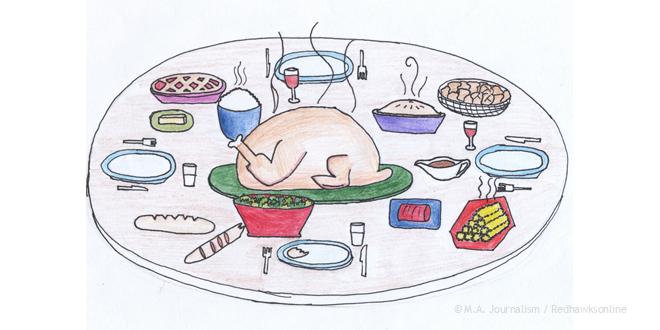Considering the bonds between body, spirit and mind
“You just think that because you’re a bleeding heart Minnesota liberal,” my aunt accuses.
“Maybe I am,” my dad declares loudly, “but that doesn’t mean I’m wrong. Please pass the turkey.” I sigh. Just a normal Thanksgiving dinner in Wisconsin.
Not everyone’s Thanksgiving meal involves such political attacks, but most families do celebrate with an excess of food. At school before the holiday, students discuss their favorite Thanksgiving meals, whether classic, like turkey, cranberries and stuffing, or original, like quinoa salad and hot dish. Teens declare the prospects of meals to come in reverent tones, proclaiming the superiority of their families’ cooking and their resolve to eat as much as humanly possible on this annual day of gratitude.
Gluttony is defined as habitual greed or excess in eating, and although the idea can pertain to more than just food, Thanksgiving is an apt time to air out this most tolerated of sins. When we look around our country, we see an interesting contradiction. The media sets unrealistic standards of beauty that often coincide with unnatural thinness, while giant hamburgers and ice cream cones are advertised and consumed with little regard to health. Even at Minnehaha, treats are brought in to advisory or class on a regular basis, and students and teachers feel few qualms about eating as much junk food as is available. At first glance, it might seem silly that something as seemingly innocent and thoughtless as overeating could be classified as one of the Seven Deadly Sins.
However, it is exactly that thoughtlessness that makes gluttony so dangerous. There are grounds, both religious and secular in nature, for avoiding the sin of gluttony.
I Corinthians 3:16 asks, “Don’t you know that you yourselves are God’s temple and that God’s spirit lives in you?” The Church has classified gluttony as a sin because when we overeat without regard to ourselves or our responsibility toward our bodies, we are desecrating exactly that which is believed to be holy: the body. Every day, people make decisions that contradict the idea that their body is a dwelling place for the spirit of God, or even just a finite resource to be well cared for.
Gluttony would not be seen as such a sin, however, if it only affected the person whose decision it was to overindulge. The fact is that the idolization of food in our culture leads people to worry about food first, friends later.
Parties, to some extent, are evaluated on the food options available, rather than on the potential interpersonal connections that might be made there. Daily routines are built around meal plans and mental menus. Social schedules, too, are dependent upon food.
All this is not to say that cake is sinful. Rather, as usual, it is a middle path that must be tread in order to stay within the bounds of righteousness. Various historical philosophies, both secular and religious, have extolled the idea of the Golden Mean, the Aristotelian view that virtue occurs at the center of two extremes. Major religions such as Buddhism, Islam, Judaism and Christianity all include sacred texts that encourage followers to live by the mean. Classical Roman poets like Horace, while they extolled pleasure as the highest good, still sought after the golden mean as their road to happiness in life.
The theme behind all of this philosophy is simple:allow for small indulgences while keeping physical, spiritual and mental health in mind. Thanksgiving is an appropriate time of year to consider the important bond between body, spirit and mind.
While there is no need to avoid the piles of scrumptious food altogether, taking the extra time to listen to your body will show that most important of resources the respect it-and you-deserve. It also might prevent that yearly food-baby.

